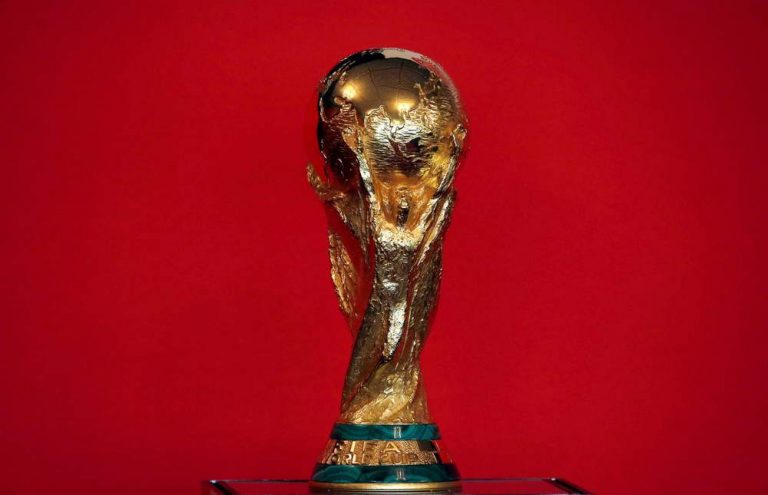
Born in the south east of Ireland, Simon put his life-long love of football to good use when he started a successful independent blog in 2010. That opened up an alternative route to a career in journalism, and having had work published across a number of sites and publications, Simon joined the staff at Spotlight Sports Group in 2018.
So far, the 2018 World Cup has been heavy on goals and light on indiscipline. Colombia’s Carlos Sanchez became the first player to be sent off in Russia, after he was given his marching orders by Slovenian referee Damir Skomina, just three minutes into the Colombian’s clash with Japan in the 15th game of the tournament.
The lowest number of cards handed out in any one fixture so far was zero in Argentina’s uninspiring 1-1 draw with Iceland. There were eight cards dished out during Belgium’s comfortable 3-0 over Panama, though the average of 3.06 cards per game after 17 matches is relatively low.
That card average isn’t overly surprising, especially when you consider that the players are desperate to avoid the subsequent one-game suspension handed out for the accumulation of just two bookings.
If we get ourselves knee deep in the sometimes-murky depths of World Cup history, we see that Germany are officially the competition’s dirtiest ever team. The Germans have been shown 124 yellow cards in World Cup tournament, the latest 2 of which were handed out to Thomas Muller and Mats Hummels in the space of a minute in their surprise Group game loss to Mexico. German players have been sent off on 7 separate occasions it the World Cup.
Argentina are ranked as the second dirtiest team in World Cup history with 112 yellow cards and 10 reds, while their South American rivals Brazil run them close in third having amassed 98 yellows and 11 red cards over the years. The top three dirtiest teams are of course also among the most successful – Germany, Argentina and Brazil have won 11 World Cups between them and they have appeared in a combined total of 20 finals. Maybe cranking up the filth is the way to go?
Let’s continue our nostalgic spelunking as we descent deeper into the World Cup’s grim underbelly to look at some of the dirtiest individual matches in the tournament’s history.
Read More: The 5 Most Shocking World Cup Group Stage Exits
Portugal vs Netherlands – World Cup 2006
Dubbed “The Battle of Nurnberg”, Portugal’s Last 16 clash with the Netherlands is officially the dirtiest World Cup match in history. 16 yellow cards and 4 red cards were dished out as the teams’ attempted to kick each other into submission.
The game was just two minutes old when Russian referee Valentin Ivanov opened his pocket for the first time, booking Dutch midfielder Mark van Bommel for a late tackle. After that all hell broke loose as the players tried to write autographs on each other’s legs with their studs. Retaliation was met with counter-retaliation as football played second fiddle to violence.
Ricardo, Nuno Valente, Maniche, Luis Figo and Petit were booked for Portugal, while Deco and Costinha were both sent off after two separate yellow card offences. For the Netherlands, van Bommel was joined on the referee’s naughty list by Wesley Sneijder and Rafael van der Vaart, while Khalid Boulahrouz and Giovanni van Bronckhorst were sent off for collecting two yellows.
In the midst of the battle cries and skirmishes, Maniche scored the only goal of the game. The real winner that evening was thuggery however……….and Portugal – they won 1-0.
Read More: Weird World Cup: 10 of The Strangest Stories in World Cup History
Chile vs Italy – World Cup 1962
This game was so utterly, deplorably rough that the referee that day, an Englishman called Ken Aston, would invent and introduce yellow and red cards to ensure football would never again see such barbary on a pitch. Fortunately, Aston wouldn’t live long enough to witness Tony Pulis’ Stoke in action.
The source of the loathing in the lead up to the contest between Chile and Italy can be traced back to two Italian journalists. While reporting on the World Cup from Santiago, Antonio Ghirelli and Corrado Pizzinelli depicted a largely unflattering description of the city which stoked up the locals. They further incited hatred by questioning the morals of the local Chilean women and that sent the city’s inhabitants over the edge.
In an excerpt, they said: “the phones don’t work, taxis are as rare as faithful husbands…………. its population as prone to “malnutrition, illiteracy, alcoholism and poverty………….entire neighbourhoods are given over to open prostitution. This country and its people are proudly miserable and backwards”.
In fear of their safety, the journalists had to flee Santiago just after their articles were published. But already the Chilean press had returned fire, describing the Italians as fascists, mafiosos and oversexed (that’s a thing?).
When the match itself kicked-off, the toxic atmosphere in the stadium soon spilled over on to the pitch. The first foul of the game came after just 12 seconds and it was quickly followed by punches a plenty, a broken nose for Humberto Maschio and a kick in the head for Leonel Sánchez. The local police had to rush in from the sidelines to separate the melee on more than a couple of occasions too.
Chile eventually won the “Battle of Santiago” 2-0 thanks to late goals from Jaime Ramirez and Jorge Toro.
Read More: The World Cup Trophy: A History
West Germany vs Netherlands – World Cup 1990
When West Germany faced the Netherland in the Last 16 of Italia 90, tensions between the nations, in football terms, had already been high. The Dutch had lifted the European Championships two years earlier, beating the Soviet Union 2-1 in the final on German soil in Munich.
They had come from behind to win late on in the Semi Finals against the hosts, eventually emerging victorious after an ill-tempered 2-1 triumph in Hamburg. At full time, Ronald Koeman had pretended to wipe his backside with the swapped West German jersey he received from Olaf Thon. That didn’t go down well.
Furthermore, there was a huge inter-club rivalry bubbling away alongside the international one. Dutchmen Marco van Basten, Ruud Gullit and Frank Rijkaard played in Serie A for Milan, while West Germany’s Lothar Matthaeus, Jugen Klinsmann and Andreas Brehme played for city rivals Inter. As luck would have it, the Last 16 fixture between the nations was scheduled to be played at Milan’s and Inter’s shared home – the San Siro.
The match’s biggest flashpoint came just after the 20th minute when Rijkaard cut down Rudi Voller with an ill-timed challenge. Rijkaard was booked and as he was running back into position behind Voller, he aimed and landed a spit into the back of Voller’s finely crafted perm.
Naturally, Voller was incensed and he ran to confront Rijkaard. The referee Juan Carlos Lousta booked Voller for his protestations, but when play restarted, the visibly irate West German clashed again with Rijkaard and was sent off. The Dutchman stalked Voller, shadowing him as he made his way off the pitch and incredibly, spit at him again. This time the referee spotted the reprehensible act and sent Rijkaard off too.
West Germany battled their way to a 2-1 win against the Netherlands and went on to win the tournament outright, eking past Argentina in the Final.
Read More: Germany’s Best Ever World Cup XI
Netherlands vs Spain – World Cup 2010
You might think we are picking on the Netherlands a little here, but really, their reputation for being very bold boys in the World Cup is just as well established as their reputation for producing magical players, teams and moments.
The Netherlands hadn’t displayed any particularly psychotic traits en-route to the World Cup Final in South Africa in 2010. In fact, they had largely played their way through the opening rounds keeping true to the great passing and technical traditions of the Dutch teams of yesteryear.
However, it’s unclear whether their Coach Bert van Marwijk’s motivational techniques lit the fire or that they simply decided that kicking the Spanish players was their only hope of victory, but whatever the reasoning, the Dutch arrived in Johannesburg with all the fury of a horde of Vikings disembarking a longship.
The bewildered English referee Howard Webb just couldn’t keep up with the brutal action unfolding around him. And even though he issued 14 yellow cards in all, the 1 red card in the match, shown to John Heitinga, was a pale reflection of what actually transpired. Nigel de Jong’s infamous six-studder to Xabi Alonso’s chest wasn’t fully punished and sadly the incident is the abiding image of that final, overshadowing Andres Iniesta’s extra time winner.
Follow Free Super Tips on Twitter to stay up to date with our daily tips and predictions or browse more football content on our website:


